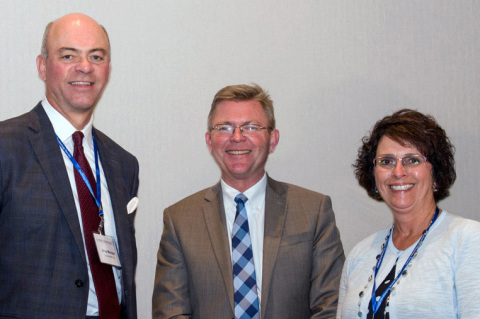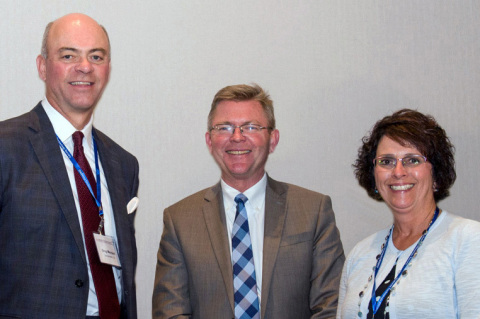WALTHAM, Mass.--(BUSINESS WIRE)--A series of studies and presentations included in the 6th International Hospital Diabetes Meeting highlighted the high cost of poor glucose management, and in particular, severe hypoglycemia (<40 mg/dL) in the acute care setting. With thirty to forty percent of ALL hospitalized patients requiring insulin therapy, not just those with diabetes, the common problem of insulin mismanagement has significant impact on care quality, patient safety and patient experience, as well as cost and value.
One comprehensive case study showcased how implementation of Glytec’s eGlycemic Management System®, or eGMS®, enabled Kaweah Delta Medical Center to adopt best practice for insulin therapy, resulting in first-year cost savings of $7,489,420, a figure rooted primarily in two key areas:
- 73.7% reduction in severe hypoglycemia <40 mg/dL
- 47.4% reduction in point-of-care blood glucose testing
The Visalia, California-based regional academic medical center also saw a 23.1% reduction in overall length of stay for patients who received insulin therapy.
Click here to view the study by Kaweah Delta Medical Center.
At 13.2%, nowhere in California is the prevalence of diabetes higher than Tulare County, home to Kaweah Delta Medical Center and the communities it serves. With little endocrinology support and significant variation in provider practice, Kaweah Delta Medical Center knew it needed to standardize diabetes care and prioritize glycemic management for all patients requiring insulin therapy. Glytec’s eGMS® was implemented March 2016, and the case study examined pre-eGMS® baseline data from calendar year 2015 to post-eGMS® data from March 2016 to March 2017. Rose Newsom, Director of Nursing Practice, described how Kaweah Delta Medical Center’s transition from sliding scale insulin to basal bolus insulin, enabled by eGMS®, was a driving force behind dramatic improvements in both clinical and financial outcomes. With eGMS®, the institution successfully converted from 95% utilization of sliding scale insulin to 96% utilization of basal bolus insulin.
Dr. Greg Maynard, Chief Quality Officer and Clinical Professor of Medicine at UC Davis Medical Center in Sacramento, California, long recognized as a leading voice in the effort to improve inpatient glucose management, preceded Newsom with a presentation focusing on the need to reduce hypoglycemia, which he emphasized as being “too common and costly” as well as “preventable.” Maynard suggested that perhaps it’s time the medical community classify severe hypoglycemia as a ‘never event,’ offering an impressive array of compelling data to support this assertion, including the fact 57% of adverse drug events involve hypoglycemic agents.
Dr. Paul Chidester, VP of Medical Affairs at Sentara Norfolk General Hospital in Norfolk, Virginia, later shared Sentara Healthcare’s journey to becoming a leader in advanced glycemic management, a journey that began nearly a decade ago with several sentinel events. Although early gains derived from a homegrown system for critical care units and a paper-based basal bolus insulin protocol for medical-surgical floors were promising, they ultimately proved unsustainable absent advanced technology, prompting the 14-hospital not-for-profit health system to partner with Glytec. Chidester also provided insights into how clinicians can gain buy-in for a broad-based glycemic management initiative, reflecting on key aspects of the business case he used to secure approval for Sentara Healthcare’s acquisition of Glytec’s eGMS®. He in turn detailed the myriad quality, safety and economic improvements the health system has realized since implementing eGMS® across all acute care facilities some five years ago following several years of use at its flagship hospital. Chidester also referenced Sentara Healthcare’s plans to extend use of eGMS® to chronic care populations later this year.
Click here to request a summary of the presentations by Newsom, Maynard and Chidester.
Finally, another study presented in poster form by Dr. Marina Rabinovich, Clinical Pharmacist Specialist at Grady Memorial Hospital in Atlanta, Georgia, underscored the clinical impact of Glytec’s eGMS® for personalized insulin therapy among critically ill patients at a large academic medical center, also demonstrating significant reductions in hypoglycemia. The study compared patients treated using eGMS® to patients treated using usual care. Results included:
- 73% reduction in patients who experienced severe hypoglycemia <40 mg/dL, eGMS® vs usual care
- 54% reduction in patients who experienced mild hypoglycemia <70 mg/dL, eGMS® vs usual care
Additionally, at 160.76 mg/dL, the average final blood glucose for patients treated using eGMS® was mid-point of the target range (140-180 mg/dL), whereas, at 180.21 mg/dL, the average final blood glucose for patients treated using usual care tipped the very top end of the target range.
Click here to view the study by Grady Memorial Hospital.
“Hospital executives have a lot to contend with as they prepare their organizations for more value-based reimbursement. These presentations and studies again demonstrate why glycemic management truly merits prioritization when it comes to improving quality of care, patient safety, cost and value,” says Raymie McFarland, Glytec’s VP of Quality Initiatives. “There’s an abundance of compelling evidence surrounding the need for standardization and the value of adopting best practice. The case study presented by Rose Newsom of Kaweah Delta Medical Center is a great example of how employing a computerized, evidence-based systems approach with Glytec’s eGMS® can result in an annualized cost savings of nearly $7.5 million for a single institution.”
About Glytec
Founded in 2006, Glytec is the pioneer and leader in diabetes therapy management software, enabling healthcare organizations to standardize acute and chronic care, and achieve best practice for glucose control. The company’s comprehensive eGlycemic Management System® (eGMS®) has been proven to dramatically reduce drivers of cost and clinical variation, including hypoglycemia, readmissions, length of stay, complications and A1C levels. Its efficacy and safety have been validated by more than 55 research studies. eGMS® centers on an FDA-cleared insulin dosing solution that supports personalized intravenous and subcutaneous therapy for adult and pediatric populations. It integrates seamlessly with EMR and connected device systems for streamlined use across the entire continuum of care, including at-home, provider-directed care managed through telehealth, population health and other value-based programs. The company’s cloud-hosted software-as-a-service (SaaS) delivery model allows for rapid implementation and anytime, anywhere access. Glytec has offices in Waltham, Massachusetts and Greenville, South Carolina. For more information, visit www.glytecsystems.com.




